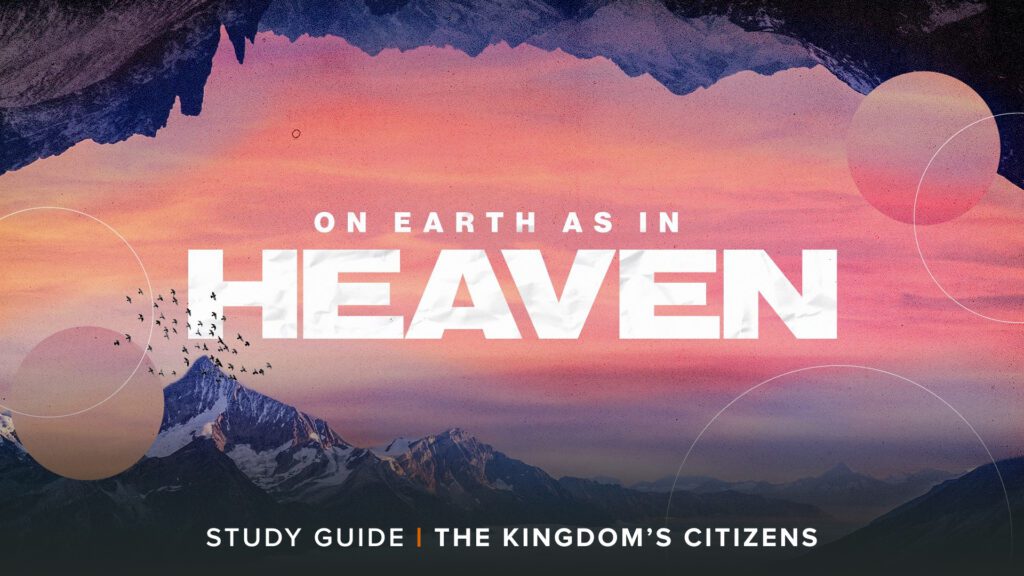
The Kingdom’s Citizens
Newbreak’s Sermon Study Guide is an in-house resource that serves sermon-based Life Groups and/or individuals who want to reflect further on how the message contributes to their spiritual formation. In this week’s study, we consider what the culture of God’s kingdom looks like, specifically in how Jesus talks about it in the beginning of his famous “sermon on the mount."
Icebreakers for Life Groups
- If your personality was a fruit, what fruit would you be and why?
- What has been something that God did in your life that became an unexpected blessing?
Going Deeper Into the Message: What does the culture of God’s kingdom look like?
Read Matthew 5:1–12
Point 1 – Experiencing God’s blessing in ways we don’t expect.
When we examine the “beatitudes” Jesus gives us, we don’t see a list of common characteristics we would normally chalk up to being “blessed.” But that is sort of the point. Jesus is calling these people the citizens of his kingdom. To use the first one as an example, the “poor in spirit” are “blessed” because they see their spiritual condition as bankrupt apart from God. Their reliance on God is their strength. Each one has something of an oddity like this. And so, we gather from this list that being “blessed” is not always what we would expect. And that’s okay. But when we posture ourselves, like the beatitudes describe, we allow God’s reign in our lives to make us kingdom culture-bringers “on earth as in heaven.”
Questions for Group Discussion or Personal Reflection
- Which of the beatitudes shock you the most? Why?
- Which beatitude do you think the Holy Spirit is putting on your heart to meditate on?
- How do the beatitudes paint a picture of God’s people?
Read Matthew 5:13–16
Point 2 – Bring God’s flavor to the world.
Isn’t it amazing how one ingredient can change a whole recipe? When we bring the “salt” God made us to be, the world looks different. Consider Newbreak’s Vision statement: “Developing Christ-centered leaders who change their world.” Disciples of Jesus have an undeniable impact on the world around them. As salt was virtually necessary for everyday life so the disciples are virtually significant and necessary to the world in their witness to God and His Kingdom.
Check out the way the MSG paraphrase captures this idea...
Matthew 5:13 (MSG) Let me tell you why you are here. You’re here to be salt-seasoning that brings out the God-flavors of this earth. If you lose your saltiness, how will people taste godliness?
Jesus was saying that His disciples would have an influence on a decaying world. The same is true for us. Do the words I speak bring out the best in others? Are my actions building up or tearing down? As the world needs salt, the world needs Christ followers, the world needs God’s work in your life.
Questions for Group Discussion or Personal Reflection
- How does this explanation of the famous “salt of the earth” passage enhance your understanding of it?
- You are called to bring out the “God-flavors of this earth.” What might that look like in your context? Consider your work, home, and social spheres.
Point 3 – Bring God’s light to the dark places of the world.
Jesus came in human form to help us understand how God wanted His people to behave from the beginning. Jesus came to be the light in the darkness and to teach us how to be that light. But as one man, as He was here on earth, His light only reached so far. But as someone who would teach a group of followers how to be that light, He lit up an entire world for generations. He wants us to take the light that we have within us, the Holy Spirit, and let it shine wherever we are, wherever we go. Jesus doesn’t want us to sit in a room with other lights and hide from the darkness. He wants us to shine into the dark spaces and light them up. He wants us to bring comfort to others, to bring healing, to help people find the joy and hope that only He can give.
Our mission, should we choose to accept it, is to move into the places that need Him, the places that seem scary and overwhelming and bring His peace to them. Our light should be our good deeds that we do for others. Why? So “that they may see your good deeds and glorify your Father in heaven” (Matthew 5:16). Why do the good deeds? Why make sure that others can see the good that we do? For our own edification? For our own honor and glory? No! We do them so that others are pointed to our Father in heaven and can see Him in us and honor and glorify Him.
Questions for Group Discussion or Personal Reflection
The metaphor of “light” can mean a variety of things in a variety of contexts. What do you see Jesus meaning here with his use of calling his followers the “light of the world”? How might this be different from Jesus’ own claim to be the “light of the world” in John 8:12?
- How is light a vital element of God’s kingdom culture?
- What dark spaces have been too scary for you to enter lately?
- What do you need to ask God for in order to take His light to those dark spaces?
Final Challenge Questions
- How are you going to think or live differently in light of what you have read, heard, and discussed this week?
- How does this week’s message shape or nurture your relationship with God?
- BONUS: For those of you with kids or around kids: What is one truth from this message that you can share with your kids in a way that they would relate to or understand?
